The Rev. W. J. McMullan
A Short Sad Ministry
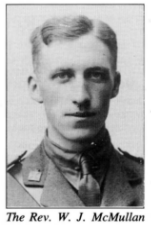 On
the death of the Rev. James Rentoul, the Rev. Thomas Doey of First
Dromore was appointed by the Presbytery to be Convener of the Commission
in charge of the congregation. On
the death of the Rev. James Rentoul, the Rev. Thomas Doey of First
Dromore was appointed by the Presbytery to be Convener of the Commission
in charge of the congregation.
A meeting of the congregation was held on the 23rd of
January 1917. Mr. W. J. McMullan, a licentiate of the Rathfriland
Presbytery, who had preached on the preceding Sabbath, `had so well
pleased the people' it was decided to bring his name before the
congregation. After some discussion it was proposed by J. A. Doak, the
treasurer, and seconded by R. H. Mackey, the senior elder, that a Call
should be made out to Mr. McMullan. This was unanimously supported. At
the time he was assistant to Dr. McGranachan of Derry. In less than a
month after the Rev. Rentoul's death the vacancy was filled and Mr.
McMullan was ordained on 1st March 1917. This must be a record. the Rev.
W. J. McMullan
A very detailed account of the proceedings on the 1st
March is recorded in the Dromore Times of Saturday 3rd. Mr. McMullan was
a son of the soil, his father being a farmer in the townland of Emdale,
Rathfriland. This district had the distinction of having produced a
number of outstanding ministers, the most notable being the Rev. Patrick
Bronte, the father of the famous novelists.
After training at the local National School he went
to Rathfriland Classical School, where he showed promise of unusual
ability. He then went to Magee College, Derry, where he gained
distinctions every year.
He was brought up in connection with Brookvale
congregation, where he identified himself with Sunday School work.
On the day of his Ordination, Professor David Smyth,
who was unable to attend, wrote: `I have intimate knowledge not only of
his scholarship, but of his personal character and his rich endowment
with the qualities which go into the making of a true minister of the
Lord Jesus Christ and I confidently anticipate for him by the grace of
God a career of usefulness and honour in the years to come.'
Among those who sent letters of apology and kindly
greetings was one from Captain J. L. Rentoul, of the Royal Army Medical
Corps, son of his predecessor. A toast was proposed to the new minister
who replied in a memorable speech. In closing he said "I am conscious of
my many deficiencies and of my inability to succeed the late Mr. Rentoul
in the ministry of this congregation, where he laboured so faithfully
for so many years. You will not soon forget him, and I do not ask you to
forget all that Mr. Rentoul was to you in your home life, in your joys
and in your sorrows and how he devoted himself to the work of helping
others.' May his unselfish life ever be an inspiration to you and to
me."
"It is difficult for one so comparatively
inexperienced as I am and with such a scanty knowledge of the great
world around us to follow such a man, but in my own humble way, under
the guidance of God, I hope to be a workman who needeth not to be
ashamed. I dare not face the future except relying fully on Almighty God
who can perfect His strength in human weakness. If I am to succeed at
all I will need your sympathy, forbearance and above all your prayers. I
will work for your good to the best of my ability as God enables me. I
am confident that you will give me your loyalty."
After his Ordination and Installation on the 1st
March 1917 Mr McMullan took up the work of the congregation with vigour.
Later that year additional elders were elected and ordained. They were
Joseph Dawson, James A. Doak, Thomas Johnston, Stephen Mercer, James
Thompson. The first decision the augmented Session made was to cease to
use fermented wine in the Communion Service.

On the 20th January 1918 Mr. McMullan informed the
Session that he had had a letter from the Clerk of Assembly, Dr. W. J.
Lowe, saying that he had been nominated by the Government Committee as
an Army Chaplain and to bring the matter before the congregation to get
his release. This was done, and Sunday 18th August was his last service
before going to France. This being so the elders arranged a celebration
of the Lord's Supper.
Mr. McMullan informed the Session that he had secured
the services of a Mr. Alex Wray, who was assistant to the Rev. W.
Witherow, Westbourne, Belfast, to be responsible for the pastoral
oversight of the congregation while he was away.
On the 23rd February the following year Mr. McMullan
wrote to the Session to say he was thinking of joining the army of
occupation in Germany. The members of Session were unanimous that in the
best interests of the congregation it would be better if he returned.
This was communicated to Mr. McMullan pointing out also he would have to
make the final decision. Mr. McMullan decided to ask for release. Just
before this the pastoral duties had been taken over by the Rev. R.
Strawbridge. By the end of the year the Rev. McMullan had been
demobilised.
The Rev. McMullan did his pastoral visiting by motor
bike which was a novelty in those days. Very often he had a side-car
attached. This was a source of tears and pleasure. He often offered the
children a ride in the side car, but fearful parents sometimes hesitated
thinking it too dangerous. Where parents agreed to a ride in the fearful
machine the children were delighted.
An interesting minute of a meeting of Session and
Committee held on the 29th April 1919 tells us that a letter was
received from Mr. Joe Martin asking the Committee to let a part of the
field at the side of the church for a motor garage. The Rev. McMullan,
who heard about this request, wrote from France a very strong letter
opposing such an action. (Mr. Martin is remembered for the part he
played with Harry Ferguson in building the first tractors and for his
part in building a plane, a replica of which is in the museum in Dublin
(there is a similar one at Cultra). Guided by Mr. McMullan they turned
down the application.
Shortly after the Rev. McMullan was demobilised, a
special meeting of the Session and Committe was held on the 19th January
1920 to make some major decisions. In honour of Mr. McMullan, who had
had been demobilised after serving with the forces as Chaplain for
almost one and half years, Mr. Doak, the treasurer of the congregation
(the records indicate that he was a worthy man who gave the congregation
many years of faithful and generous service) provided a supper. Mr.
McMullan spoke appreciately of Mr. Doak's kindness and proceeded with
the business of the meeting.
It is very interesting to set out the matters discussed
that evening (January 1920).
- Alterations and renovations to the church building, including
the provision of a pipe organ.
- The building of a Lecture Hall to be called the Rentoul Memorial
Hall in his memory, and in memory of the brave men who lost their
lives in the war.
- It was discussed and then proposed that two stained-glass
windows should be put in the church�one in memory of the Rev.
Rentoul and the other in memory of the fallen. At an earlier meeting
memorial tablets had been proposed. This decision was rescinded.
Later the committee reverted to memorial tablets (now in front wall
in the vestibule).
For the anticipated schemes a sum of �5,000 would be needed, it was
thought.
Little did the Rev. McMullan know, or the members present know, that
within a few days, 11 to be exact, he would be killed and the
congregation vacant.
The Lecture Hall was not built until 1931. It was never given the
name Rentoul�this was a sad omission.
The church was not renovated until 1953/54 when a pipe organ was
installed.

The Rev. McMullan and some members of the
congregation had gone to the Ordination of the Rev. R. Strawbridge
(who was married to The Rev. McMullan's sister) in First Broughshane
Church in County Antrim. The Rev. Strawbridge had been in charge of
Banbridge Road during the last part of the Rev. McMullan's time in
the army and had been a popular young minister in the congregation.
On the way home along the Shore Road at Whitewell,
about 6 o'clock in the evening, the motor car in which the Rev.
McMullan and some friends were travelling was involved in a tragic
accident. The car was driven by D. P. Doak, the son of the
treasurer. Suddenly a horse and cart came across the road at a
gallop and out of control, right in front of the car. The driver
tried to avoid a collision by turning, but the way was blocked by a
large steam roller - the road was being repaired. There was a
collision and the Rev. McMullan, who was sitting in the Dicky seat
(a seat for one or two in the open at the back of a car), was hit by
a shaft of the cart and knocked out on to the road. A doctor was
sent for and Dr Loughridge, J.P., was soon on the scene. His son,
who was also a doctor, was with his father. After a brief
examination it was obvious that the Rev. McMullan was in a serious
condition. He was taken to the San Remo nursing home. Dr Irwin and
Professor Sinclair did their utmost to save his life, but in spite
of everything his injuries proved fatal.
'The funeral took place on Monday the 2nd
February. The service in the home was conducted by the Rev. A.
Thompson of First Dromore and the Rev. T. J. Harrison of
Rathfriland.
All creeds and classes were there. There was a
great sadness everywhere. The hearse was drawn by four horses, which
were plumed. It was never used, for the coffin was carried from the
manse to the church, the streets lined with onlookers, sad that a
young man, 27 years old, who had come home safely from the dangers
of the battle line, should be called away so tragically. Everywhere
there was regret, deep poignant regret. The Rev. Hamilton of Lisburn
and the Rev. M. Logan of Rathfriland were responsible for the church
service, the Rev. Logan giving the address. At the graveside the
Rev. J. T Anderson, Bannside, and the Rev. T. Doey, formerly of
First Dromore, took part.
On the following Sunday wonderful tributes were
paid by the ministers of the sister churches, the Rev. A. Thompson
in First Dromore, Canon. J. W. Cooke in Dromore Cathedral and the
Rev. H. J. F. Ranson in the Methodist Church.
Copy of a letter drawn up and passed unanimously
at the morning service on Sunday, 15th February 1920, and sent to
the McMullan family:- `It is with inexpressible grief and sorrow
that the congregation of Banbridge Road Presbyterian Church convey
to Mr and Mrs McMullan and family their sincere and heartfelt
sympathy in the bereavement which they have sustained in the death
of their son. This congregation mourns and sorrows for the loss of a
beloved pastor who had so faithfully, earnestly and nobly carried on
God's work amongst them for the past three years, and the partakers
of the heavy burden, do the more genuinely sympathise with the
parents, sister and brothers in the irreparable loss they have
sustained and the great trial they have been caused to endure. The
congregation earnestly pray that God the All Merciful may sustain
them with His Grace and impart strength to them to bear the loss of
him who was so dear to them."

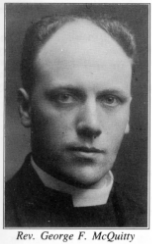 The
Rev. George. F. McQuitty was Ordained and Installed on Thursday 27th
May 1920. He was a licentiate of the Ballymena Presbytery. He was
brought up in connection with First Ballymena where his father was
an elder. The father, Mr George McQuitty, was a well known
businessman having been associated with the firm of Robert Morton &
Co. all his life. His mother, like his father, was a devout
Christian. There were four sons, all of whom entered the ministry,
George. F. being the third. He received his education at the
National School, Ballymena Academy and Magee College, Londonderry. The
Rev. George. F. McQuitty was Ordained and Installed on Thursday 27th
May 1920. He was a licentiate of the Ballymena Presbytery. He was
brought up in connection with First Ballymena where his father was
an elder. The father, Mr George McQuitty, was a well known
businessman having been associated with the firm of Robert Morton &
Co. all his life. His mother, like his father, was a devout
Christian. There were four sons, all of whom entered the ministry,
George. F. being the third. He received his education at the
National School, Ballymena Academy and Magee College, Londonderry.
After licensing he took charge of First Armagh
for the Rev. David Dowing, and of Clough for the Rev. Richard Hall.
These were temporary appointments caused by illness or absence. He
also had short periods of service in Broughshane and Second Antrim.
He was highly thought of in all these churches and his work was much
appreciated. These experiences were a fine preparation for his
ministry, first in Banbridge Road and then in First Newtownards.
He received a unanimous Call to Banbridge Road. A
reception was held on Friday evening, and at this he received a
pulpit gown. Mrs Campbell and Mrs Magowan presented it on behalf of
the ladies of the congregation. The Rev. Herbert Orr, who had been
in charge of the congregation, received a dressing set in
appreciation of his work.
It would seem that at the time of the Rev.
McQuitty's coming to Dromore a mission conducted by the Rev. W. P.
Nicolson had been arranged by First Dromore and at his first meeting
of Session there was a request from First Dromore for the use of
Banbridge Road Church on week nights. This request was granted and
it was also decided to close the Sunday evening services to enable
members to attend the mission.
At a meeting of Session and Committee held on the
1st August 1921 the matter of the Memorial Tablets was dealt with.
It was decided to have them made and dedicated as soon as possible -
one in memory of the Rev. Rentoul and one bearing the names of those
who had served in the war and those who had fallen. The work was to
be carried out by a Mr Robinson of Belfast. When it was confirmed at
a later meeting that the Memorials would be ready by mid September
it was decided that the unveiling and dedication should take place
on the 25th September at a special service at 3.30pm.
On the day, the Rev. A. Gibson of First Lurgan
gave the address and Lieut. Col Sir William Allen unveiled the
Soldiers Memorial, and Mrs Rentoul unveiled the memorial to her
husband. These memorials, which were on the front wall of the
church, were moved to the vestibule wall when the Church was
renovated in 1953.
Towards the end of the Rev. McQuitty's ministry
it was decided to install electric light in the church as the gas
supply had been intermittent. A special meeting was held to deal
with this. There was an estimate - �61.15 shillings for 37 lights in
the church and school rooms. When this was reduced to �60 it was
decided to accept the tender and to have the work done as soon as
possible.
The Rev. McQuitty received a Call to First
Newtownards and was installed on the 4th November 1924. Later in
1947 he was to move to County Donegal. On the occasion of his
Installation in Crossroads, the Banbridge Road congregation was
represented by the Rev. Hugh R. Moore, who brought greetings to him
from his former congregation. While there Mr. McQuitty married a
Miss V. Palmer of Newtownards.

The Rev. William Bates
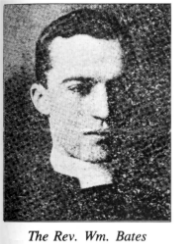 The
Rev. William Bates was installed on Thursday the 26th March 1925 in
succession to the Rev. George McQuitty. He was born in Strabane and
went to the Academy there. He did his arts course at Magee College,
Derry, and his theological course was taken at Assembly's College.
He graduated in 1909 and became assistant to Dr. J. D. Osbourne,
Rutland Square, Dublin. Later he moved to Albert Street, Belfast,
subsequently spending some time under the Home Mission in Tipperary
and Kerry. He was ordained in Grange, Co. Antrim, in 1912. The
Rev. William Bates was installed on Thursday the 26th March 1925 in
succession to the Rev. George McQuitty. He was born in Strabane and
went to the Academy there. He did his arts course at Magee College,
Derry, and his theological course was taken at Assembly's College.
He graduated in 1909 and became assistant to Dr. J. D. Osbourne,
Rutland Square, Dublin. Later he moved to Albert Street, Belfast,
subsequently spending some time under the Home Mission in Tipperary
and Kerry. He was ordained in Grange, Co. Antrim, in 1912.
During the First World War he spent two months at
the Front with the Y.M.C.A.
He was Commandant of the `B' Special Constabulary
and was the recipient of a gift in appreciation of his service with
them.
He preached for Banbridge Road on a list of six
ministers. A congregational meeting was held on the 25th February
1925 and it was decided to vote on three of the candidates - Messrs
Duff, Gibson and Bates. After a second vote the Rev. Bates had the
majority and it was proposed that the Call should be made unanimous
and all present stood. He was installed on March the 26th. The
service was conducted by the Rev. Robert Kelso of Boardmills and the
sermon was preached by the Rev. A. J. Gillespie. His text was
`Reaching forth unto those things that are before.' The Charge to
the new minister and congregation was given by the Rev. A. Gibson of
Lurgan.
The luncheon on this occasion was held in the
Town Hall. In reply to the toast to the new minister the Rev. Bates,
in a speech marked for its humility, said that "The honour really
belongs to the congregation rather than to me. I am nothing, but as
minister of Banbridge Road I am something. To-day I take my place on
the honourable roll of the pastors of this church, conscious of my
own weakness but looking to Him who alone can enable me to maintain
the high traditions of the past and keep the altar flame alive. You
have given me the opportunity, you have done me a great service."
Mr. Bates, referring to an account of the early
days of Banbridge Road, said: "Banbridge Road has been referred to
as a swarm from First Dromore,
I like the comparison. A swarm has its own home
to make, its own history to make, and soon in capable hands it
becomes a very busy body. This church, I am assured, has plenty of
workers and few drones and has already so grown that additional
accommodation is envisaged."
Among those who spoke were Canon Cooke, the Rev.
Davison of the Non-Subscribing congregation and the Rev. Maguire,
Methodist. The Rev. Thompson of First Dromore was absent through
illness.
At the evening reception the new minister was
presented with robes, Mrs. W. J. H. Davidson asking him to receive
them and Mrs J. C. Wilson carrying out the robing.
Reading the minutes of the next five years one
could come to the conclusion that the main object of the Session and
Committee at that time was to postpone making final decisions. Yet
when one examines the records closely a great many worthy decisions
were made.
THE INSTALLATION OF ELECTRIC
LIGHT IN THE MANSE
On the 16th March 1925 it was decided to `put
electric through the manse.' By October this had not been done and
the matter was raised again. Dr. J. C. Wilson commented that the
winter was getting near and that the work should be done. At the
November meeting the Rev. Bates said that in view of the
congregation's financial position `it would do later.' A very
considerate attitude. He also suggested that it was time to be
thinking about the proposed hall. In December it was again decided
to postpone the `putting of electric' into the manse, Mr Bates again
giving his support with a casting vote to the proposal to postpone.
The matter was not raised again until September 1927 when an
estimate was sought - the cost was �50. Again there was some
opposition. However a final decision was made and work was carried
out.

INTRODUCTION OF THE
FREE WILL OFFERING SYSTEM
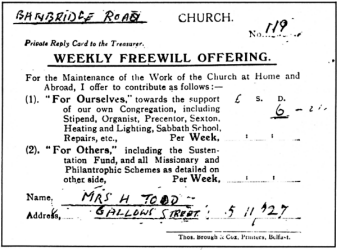
The Pledge Card at the
time the F. W. O was introduced
This was first mooted on the 3rd January 1927 and
it was decided to have Mr Irwin of the Cripples Institute to come
and speak to the congregation about the system. This proved
impossible owing to Mr Irwin's illness and it was September before
the matter was raised again. Pledge cards were distributed to the
members and the scheme began on the 1st January 1928.
At a meeting of the congregation held after the
morning service on Sunday, 2nd May 1929, the Rev. Bates brought up
the question of `introducing an organ to help in the praise
worship.' This was agreed to unanimously. Three lady members of the
Committee took on the responsibility of sending out a circular
letter of explanation and appeal. They were Mrs. J. C. Wilson. Mrs.
W. J. Cowden and Miss Jane Sterritt. The letter stated that while
the Sunday School had an organ, and it had been brought into the
church from time to time for special occasions, the moving was bad
for the organ and besides a bigger organ was needed (this explains
how over a period of seven years newspaper accounts of services
referred to an organ and organist). The first permanent organ was
installed in time for the Harvest Services 1929. Miss May Kerr was
appointed by Kirk Session as the first organist.
Early in the Rev. Bates' ministry the building of
the hall was discussed. On the 25th November 1925 it was decided to
find out `about sizes' and probable cost. Mr. George Hobart, an
architect who lived locally, was present at a special meeting of
Committee the following May. The hall was discussed at many of the
Committee meetings and Mr. Hobart was asked back on the 4th April
1927. Working plans were requested, but nothing was decided and the
months passed. By June 1930 Mr. Bates had received a Call to
Faughanvale.
At a meeting in June the members expressed the
hope that he would remain in Banbridge Road and it was proposed by
Dr. J. C. Wilson that,whether Mr. Bates went or stayed he should be
made the recipient of a testimonial in recognition of his work and
worth. However he decided to accept the Call. At the next meeting a
tender was submitted by Mr Hobart for �1,550 plus �95 to cover the
cost of lighting, heating and plumbing. It was decided by 6 votes to
5 to defer the decision until there was a new minister appointed.
Just about six weeks before he accepted the Call
the Rev. Bates presented the congregation with a very beautiful
individual Communion service in memory of his mother. Shortly after
he moved to his new congregation, he died a comparatively young man.
He had been highly regarded and always sought to work with people
for the good of the congregation. The esteem in which he was held
can be gathered from the sentiments of a letter sent to his widow
and family by the Session and Committee.
"The Session and Committee desire to place on record
their deep sense of loss and sorrow at the Rev. Bates' early Home Call.
They gratefully testify to a growing admiration of his beautiful life
and truly Christian character and are profoundly thankful for the many
sweet and inspiring memories. His all too brief ministry among them has
left a cherished heritage to the congregation. They wish to convey to
Mrs. Bates and family an assurance of their hearfelt sympathy in the
great loss and sorrow sustained by them and their prayer will be that
the God of all Grace will sustain and comfort them evermore."

THE FREE WILL OFFERING SECRETARIES
The F.W.O. scheme was introduced at the beginning of
the year 1928 (see page 32). The first secretary was S. J. Duffy who had
promoted the idea. He looked after the scheme for six years. After this
there was a succession of secretaries some of whom did a year, others
several years. They were:�Miss F. Kerr, Miss M.E. McCracken, S. Black,
J. Turner, J. Kennedy, T. Montgomery, S. Martin and H. Maisey.
In 1951 Cecil Whan was appointed and acted for seven
years until he became treasurer. Walter Clarke who had been assisting
him for two years continued to act and along with Sam Thompson served
the congregation well for a further ten years.In 1970 the number of
secretaries was increased to four. Jim Walker and Walter Spratt two of
those appointed at that time are still acting after eighteen years. Jack
Reid has been a secretary for some sixteen years and Herbie McDonald for
eleven years. Kenneth Aiken was a F.W.O. secretary for six years before
being appointed treasurer. The present secretaries all of whom have
given long and faithful service to the congregation have a total of
sixty three years to their credit. Well done. Well done indeed. Beattie
Johnston for a number of years was on the F.W.O. Committee and was ready
to help out if one of the secretaries was indisposed.

The Rev. Thomas Bole
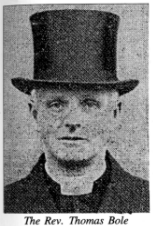 The
Rev. Thomas Bole was Installed on the 20th November 1930. His ministry
was short; eighteen months later he was called to Donore in the Dublin
Presbytery. He had been brought up in the Monaghan Presbytery and was
licensed by it. He had several assistantships in Southern churches and
finally was ordained in Upper Clonanese in February 1907. During his
ministry there, Upper Clonanese was united with Lower. In 1923 he was
called to Redrock and Drumminnis. After a short stay there he went to
Claremont, Londonderry. Owing to inferior health he decided to move from
the city to the country so when the opportunity came to leave, he moved
to Sixmilecross in 1928. After two years there he received a Call to
Banbridge Road. The
Rev. Thomas Bole was Installed on the 20th November 1930. His ministry
was short; eighteen months later he was called to Donore in the Dublin
Presbytery. He had been brought up in the Monaghan Presbytery and was
licensed by it. He had several assistantships in Southern churches and
finally was ordained in Upper Clonanese in February 1907. During his
ministry there, Upper Clonanese was united with Lower. In 1923 he was
called to Redrock and Drumminnis. After a short stay there he went to
Claremont, Londonderry. Owing to inferior health he decided to move from
the city to the country so when the opportunity came to leave, he moved
to Sixmilecross in 1928. After two years there he received a Call to
Banbridge Road.
The day of the Installation was very wet and the
caterers who were to provide lunch failed to turn up. However, the
members of the congregation rallied to the situation and with very
considerable help from Mr. and Mrs. S. J. Duffy, who had a bakery and
grocery shop, all were well fed.
The Rev. Bole, in his address, quoted from one of the
Fathers who spoke of the Church as a room of healing by the roadside of
life for the sick souls and sick bodies of men. He hoped that Banbridge
Road would be such a place. He is remembered as a good preacher, dapper
in dress and having a determination to get things done.
While it is impossible from this point in time to
assess what went wrong, in spite of the high hopes expressed at his
installation service the Session and Committee and the congregation
became divided. There were those who supported the minister and those
who opposed him. The minutes of the Kirk Session were mutilated and so
much of the record of the very stormy meetings was destroyed.
We do know there was a Presbytery Commission, under
Dr. R. Hamilton of Railway Street Church, Lisburn, which appointed an
interim session. We also know that the organist resigned and that the
choir refused to lead the praise. Some of the matters raised seem petty,
but there is no doubt that the divisions were deep, and it became
obvious that only time would heal the wounds.
In spite of this tragic background the long awaited
hall was built and dedicated.
On the 1st June 1931 a tender for �1,815 was accepted
from a local firm, Gardiner and McAlister. The chairs for the hall were
priced at eight shillings and nine pence each and guaranteed for 2
years. Fifty years later they were as good as ever, but were sold to
help provide a lighter and easier to-handle chair.
The hall was opened on Thursday, 4th February, 1932,
by Mrs. Connolly, who deputised for Mrs. A. E. Rentoul who was ill. Mrs.
Rentoul was the widow of the minister who had the foresight to buy the
ground for this purpose. The Rev. J. G. Paton M.C., D.D., Moderator of
the General Assembly, did the dedication. The Moderator of the
Presbytery was the Rev. J. H. Orr, who conducted the service. The
service began in the church; after an act of worship, there was a
procession to the new hall where Mr. George Hobart, the architect,
presented Mrs. Connolly with a key. After the dedication Mr. Bole
announced the presentation of Memorials. Short addresses were given by
the Moderator, Dr. Patton, the Very Rev. R. W. Hamilton, and the Very
Rev. T. A. Smyth. An occasion of achievement for the congregation ended
with the singing of the Doxology.
Three months later the congregation was vacant again.

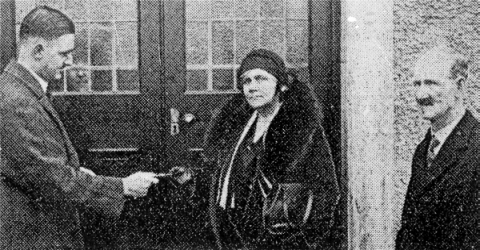
Banbridge
Road Presbyterian Church, Dromore, Opening of New Church
Hall � Mrs Connolly, who opened the hall, receiving a
souvenir key from Mr. George Hobart (Architect). On the
Right is Mr. M. Gardiner, of Messrs. Gardiner &
McAlister, the Contractors.
According to the Order of Service sheet for that
day the opening of the hall was to be performed by Mrs A. E.
Rentoul. It appears she was unwell and the Rev. Rentoul's niece Mrs.
Connolly took her place.
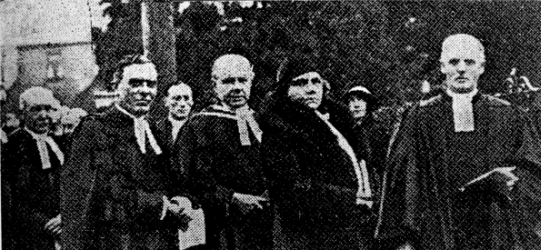
The
ministers with Mrs. Connolly at the Memorial Gate to
Dromore's New Church Hall, presented by Mr. George
Ervine in memory of his wife. (Left to right) Rev. R. W.
Hamilton, D.D.: Rev. T. A. Smyth, D.D.; Right Rev. J. G.
Patton, M. C. , D.D.: Mrs. Connolly, and Rev. Thomas
Bole.
 |